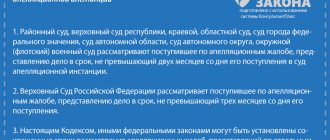What is a cassation appeal
The cassation instance is intended to correct significant violations of the rules of substantive and (or) procedural law committed by the courts during the proceedings of a civil case and which influenced the outcome of the case. Unlike an appeal, which essentially tests the entire decision, cassation is limited. When considering cassation appeals, the cassation court checks only the legality of court decisions. That is, the correct application and interpretation of the norms of substantive and procedural law (Article 379.96 of the Code of Civil Procedure of the Russian Federation). And as a general rule, only within the limits of the arguments of the cassation appeal.
This stage of proceedings is only available after an appeal. This rule does not apply to court orders. In relation to such acts, the interested party submits either an application to cancel the judicial order (when there is a deadline) or a cassation appeal according to the provided sample.
In this case, the appeal must be considered by the appellate court. If for some reason the court returned the documents, this situation is not considered as the exhaustion of other methods of appealing judicial acts. Namely, the term “exhausted” is used by Article 376 of the Code of Civil Procedure of the Russian Federation. Therefore, in some cases it is worth restoring the deadline for filing an appeal and using this tool. And only then contact the cassation office.
| Note! |
| Appeal against a court decision |
Official website of the Supreme Court of the Russian Federation
What should the court do in the absence of arguments in the cassation appeal, when judicial acts can be appealed in the cassation court, bypassing the appellate instance, from what moment does the period for cassation appeal begin to be calculated and what reasons for skipping it are considered valid? On Thursday, the plenum of the Supreme Court (SC) of the Russian Federation adopted a resolution in which it explained the features of cassation proceedings in administrative cases.
Bypassing the appeal
The Supreme Court reminds that, as a general rule, filing a cassation appeal is possible only if other methods established by the Cassation Arbitration Court have been exhausted for appealing against judicial acts, which means an appeal through the appellate procedure.
“At the same time, such methods of appeal are considered exhausted if the case is considered by the court of appeal on the merits and an appeal ruling is issued (a ruling based on the results of consideration of a private complaint or presentation), regardless of in what part and by which person the relevant judicial act was appealed,” clarifies plenum.
The highest authority draws attention to the fact that certain judicial acts are appealed through the cassation procedure, bypassing the appeal. Thus, there is no provision for an appeal against court orders and rulings on approval of a reconciliation agreement.
Procedure for filing a complaint
The resolution states that cassation complaints and submissions not filed through the court of first instance in accordance with the rules of the CAS are subject to return.
However, this rule does not apply when filing a cassation appeal or presentation against judicial acts in respect of which cassation proceedings have already been initiated based on a cassation appeal or presentation of another person. “The said complaints and submissions may be submitted directly to the appropriate cassation court,” the text of the document says.
Determination of the period for appeal
The CAS establishes a single six-month period for cassation appeals against judicial acts that have entered into legal force.
The Supreme Court notes that the specified period begins to be calculated the next day after the adoption of the appeal ruling, another ruling of the appellate court, the issuance of a court order, or a ruling on approval of the reconciliation agreement.
“If, after the issuance of an appeal ruling, the appellate court considers the appeal, presentation received from other persons for whom the deadline for filing an appeal, presentation was restored, the six-month period for appealing judicial acts that have entered into legal force should be calculated from the day following the day the latter was issued appellate ruling,” the plenum indicates.
According to the resolution, the period for drawing up a reasoned ruling of the appellate court, as well as the time for considering a cassation appeal or presentation, is excluded from the six-month period for a cassation appeal.
If the deadline is missed
If the deadline for a cassation appeal is missed, it can be restored if the court recognizes the reasons for missing the deadline as valid. As the Supreme Court notes, the deadline can be restored provided that the circumstances that caused it to be missed occurred within a period no later than twelve months from the date the appealed judicial act entered into legal force.
“The above circumstances, in particular, may include serious illness, a helpless state, caring for a seriously ill family member, other circumstances related to the personality of the applicant, as well as other circumstances beyond the control of the person, due to which he was deprived of the opportunity to timely apply for a cassation appeal. a complaint to the court (for example, the introduction of a high alert regime or emergency situation throughout the entire territory of the Russian Federation or in its part),” follows from the text of the resolution.
In the absence of arguments
The highest authority explains that if the complaint does not contain arguments for canceling or changing judicial acts in an administrative case, the cassation court is limited to checking the appealed decisions for the presence of unconditional grounds for them, the Supreme Court points out.
When checking the existence of unconditional grounds for canceling a judicial act, cassation courts must, by examining the explanations of the persons participating in the case and other evidence, establish whether the person really did not know about the time and place of the court hearing, or whether the person who does not speak the language really in which the proceedings are being conducted, was deprived of the right to give explanations, speak, make motions, file complaints in their native language or in any freely chosen language of communication, as well as use the services of an interpreter.
Nikita Shiryaev
Cassation instance
A cassation appeal in a civil case is filed with a cassation court of general jurisdiction. But through the court of first instance. This means that the addressee must be specified as the cassation court, and the documents must be sent to the court that made the decision.
There are 9 cassation courts of general jurisdiction in Russia. Where to file a cassation appeal is always indicated in the judicial act of the appellate instance. If necessary, you can use Article 23.1 of the Federal Constitutional Law “On the Judicial System of the Russian Federation.” This article contains an indication of which region belongs to which cassation court.
Sometimes a cassation appeal is filed directly with the Supreme Court of the Russian Federation (Article 390.4 of the Code of Civil Procedure of the Russian Federation). Including in the case when the cassation authority considered the cassation appeal. That is, in essence, a participant in the case has the opportunity to file a cassation appeal twice.
Rules for drawing up and submitting an application to cancel a court order
As a rule, a standard example of an application to cancel a court order can be found on stands that hang in the corridors of the courthouse. But if it is not possible to go to court specifically to fill out the form, you can write a statement without leaving home using the example below.
The unified form of the document can be divided into three parts:
- the first contains information about the court, the plaintiff and the defendant,
- secondly, the content of the problem being resolved in court,
- the third contains the request to cancel the court order itself, as well as the date the application was written and the signature of the applicant.
The document must be accompanied by copies of acts, agreements, receipts, bank statements, accounts and other papers, which are the evidence base on the part of the defendant and can turn the tide of the case in his favor.
The application is written in three copies, two of which are submitted to the court, and on the third the court secretary must put a stamp indicating, among other things, that the remaining copies of the application have been received by the court.
Drawing up a cassation appeal
When drawing up a cassation appeal in a civil case, you should adhere to the requirements of Article 378 of the Code of Civil Procedure of the Russian Federation and take the presented sample of a cassation appeal as a basis.
The cassation appeal must contain the following information:
- full name of the cassation court
- procedural status, name and address of the person filing the complaint
- name and procedural status of other persons participating in the civil case, their addresses
- civil case number in first instance
- document name - Cassation appeal
- details of all court decisions appealed in cassation
- arguments and grounds for which court decisions are illegal and subject to cancellation
- demands to cancel court decisions
- list of documents attached to the cassation appeal
- date and signature of the person filing the complaint
If the applicant in a cassation appeal was not involved in the case, he needs to justify in the complaint what rights were violated and (or) what obligations were imposed on the applicant by the court decision.
When appealing court decisions, the cassation instance has the powers to:
- cancel or change court decisions in a case
- uphold judicial decisions
- cancel in whole or in part and terminate the proceedings
- change or make a new decision on the case, etc.
The requirements in a cassation appeal must comply with the powers of the cassation court. The full list is given in Article 390 of the Code of Civil Procedure of the Russian Federation.
Copies of court decisions attached to the complaint must be properly certified. A cassation appeal can also be filed through the electronic document filing system in courts of general jurisdiction.
What types of cases does the Supreme Court hear?
In addition to identifying errors in previously resolved legal disputes, the Supreme Court deals with:
- Cases that, by the standards of the Criminal Code, Civil Code, and AK are the most complex and/or resonant. It can become the primary body that will take on the analysis of the circumstances.
- Consideration of applications, appeals, complaints in cases that fall under general jurisdiction, the result of which did not satisfy one of the parties after a number of revisions.
- Studying the trials and decisions that were made. Summarizes and identifies patterns. Generates statistical data.
- Explaining the details of trials and decisions.
- Disputes under international treaties and agreements.
Deadline for filing a cassation appeal
The deadline for filing a cassation appeal in a civil case is 3 months from the date the court ruling entered into legal force (Article 376 of the Code of Civil Procedure of the Russian Federation).
The specified period begins for decisions and rulings of the court of first instance from the moment the appeal ruling (resolution) is issued. More precisely - production in full. Not received by the parties, but rather produced by the appellate court.
The period for cassation appeal begins to run from the next day from the moment the court decision enters into legal force. And it expires on the corresponding date after 3 months. If the deadline for filing a cassation appeal is missed, it can be restored on the grounds specified in Article 112 of the Code of Civil Procedure of the Russian Federation. To do this, a corresponding application is submitted to the court. If such an application is not filed, the court will not consider the cassation appeal on its merits.
| Note! |
| Application for restoration of the deadline for filing a cassation appeal |
Filing a cassation appeal in a civil case
A cassation appeal is filed through the court of first instance.
It is now not necessary to attach certified judicial acts to the cassation appeal. The exception is a cassation appeal to the Supreme Court. Since it is being submitted directly to the Supreme Court, please attach a court-certified copy of the judicial act.
When filing a cassation appeal, a state fee is paid, except in cases where the applicant has benefits for its payment. Current details can be found on the website of the relevant court of cassation.
| The current amount of state duty payment, payment benefits as of today: | |
| state fee to court |
How to submit
Any of the above complaints are presented on paper, preferably in printed text, and submitted to the Supreme Court of the Russian Federation at the address: Moscow, st. Povarskaya, 13 (entrance No. 2). The public reception is open on weekdays from 9:00 to 18:00, except Friday (9–16:30) and break (13–13:45).
Information on the reception of citizens, criminal, civil, administrative cases and economic disputes can be clarified by calling the telephone numbers indicated in the appropriate order:
- 8 (495) 690-5463;
- 8 (495) 690-4909, 8 (495) 627-9623;
- 8:(495) 627-96-90;
- 8 (495) 690-4314;
- 8.
It is also possible to send an application for appeal by mail to 121260, Moscow, Povarskaya st., 15. In this case, it is advisable to use the service of an inventory of the attachment and notification of delivery - this way you can reduce the risk of losing documents and record the moment the application was accepted by the court.
Don’t forget to put the author’s signature and the date the document was compiled on the appeal.
Sample of a cassation appeal
Template for a cassation appeal in a civil case, taking into account the latest changes in legislation. complaints.
B ___________________________ (name of the cassation court)
through ___________________
(name of the court of first instance) Plaintiff: ________________________
(full name, address, telephone, e-mail)
Respondent:_________________
(full name, address, telephone, e-mail)
Third party: _______________
(full name, address, telephone, e-mail) Other persons participating in the case: _________ (full full name, address, telephone)
Case No.________




